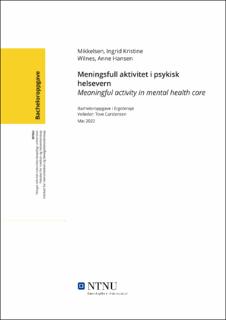| dc.contributor.advisor | Carstensen, Tove | |
| dc.contributor.author | Mikkelsen, Ingrid Kristine | |
| dc.contributor.author | | |
| dc.contributor.author | Wilnes, Anne Hansen | |
| dc.date.accessioned | 2022-07-22T17:19:33Z | |
| dc.date.available | 2022-07-22T17:19:33Z | |
| dc.date.issued | 2022 | |
| dc.identifier | no.ntnu:inspera:111435329:111443276 | |
| dc.identifier.uri | https://hdl.handle.net/11250/3007854 | |
| dc.description.abstract | Hensikt:
Hensikten med denne oppgaven er å se på hvordan meningsfull aktivitet inkluderes i behandlingen i psykisk helsevern. Vi vil se på hvordan ergoterapi og meningsfull aktivitet kan være et bidrag i behandlingen til innlagte personer.
Metode:
Besvarelsen følger IMRoD-strukturen og tar utgangspunkt i scoping review. Vi har gjennomført litteratursøk i ulike databaser for å finne relevante studier knyttet til temaet. Vi har funnet fem artikler som vi anser relevante, og benytter funnene fra disse artiklene for å besvare problemstillingen.
Resultat:
De fem utvalgte forskningsartiklene har bygd opp vårt resultat. Faktorer som meningsfulle aktiviteter, motivasjon og brukermedvirkning har vært viktige elementer for å kunne svare på vår problemstilling. Mangelen på interessante aktivitetstilbud som er basert på individets interesser og meningsfullhet fører til nedsatt livskvalitet, kjedsomhet og liten progresjon i behandling.
Konklusjon:
Brukermedvirkning i valg av aktiviteter virker til å bedre behandlingen til pasienter som er innlagt ved en institusjon i psykisk helsevern. Meningsfulle aktiviteter har en positiv effekt på innlagte pasienter. En ergoterapeut kan bidra til at pasienter kan få muligheten til å kartlegge og legge til rette for meningsfulle aktiviteter rettet mot den enkelte. Ved å få muligheten til å utføre meningsfulle aktiviteter i behandling bidrar det til økt progresjon i behandlingen, mindre kjedsomhet, mindre symptomtrykk og mindre aggresjon.
Nøkkelord:
Meningsfull aktivitet, psykisk helsevern, motivasjon, brukermedvirkning, deltakelse | |
| dc.description.abstract | Purpose:
This study aims to shed light on how meaningful activity is included in the treatment of mental health care. We will examine how occupational therapy and meaningful activity could contribute to the treatment of hospitalized people.
Method:
The study follows the IMRaD-structure and is based on a scoping review. We have conducted literature reviews in various databases to obtain relevant studies within the topic. We have established five articles that will be considered as relevant. The results of the articles will be applied to the topic question.
Result:
The selected research articles aid in the foundation of the study’s results. Factors such as meaningful activities, motivation and user participation portray key elements in the rejoinder of our topic question. The insufficient offer regarding interesting activities, that are based on an individual's personal interests and meaningfulness, induces reduced life quality, boredom, and marginal progression.
Conclusion:
User participation in the choice of activities appear to improve the treatment of patients who are admitted to an institution within the mental health care. Meaningful activities possess a positive effect for the committed patients. An occupational therapist may offer assistance for the patients to determine and facilitate meaningful activities that are aimed at the individual. Having the opportunity to perform meaningful activities contributes to an increased treatment progression, as well as a notable reduction regarding boredom, symptom pressure and aggression.
Keywords:
Meaningful activity, mental health care, motivation, user participation, participation | |
| dc.language | nob | |
| dc.publisher | NTNU | |
| dc.title | Meningsfull aktivitet i psykisk helsevern | |
| dc.type | Bachelor thesis | |
